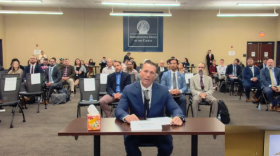The head of the Louisville Metro Department of Public Health and Wellness says the department is on track to meet goals for reducing opioid use, but that potential city budget cuts could put progress made in jeopardy.
On Wednesday, Metro Public Health and Wellness Director Sarah Moyer gave an update on the city’s opioid crisis to members of the Metro Council Health and Education Committee. Moyer said preliminary data show there were fewer overdose deaths in 2018 than in 2017.
“We peaked on our overdose deaths in 2017," she said. "And last year, at least the preliminary data is starting to trend down and again this year in 2019.”
Heather Gibson, president of program services at addiction provider The Healing Place, told the committee that opioid use is going down — but methamphetamine use is going up.
At The Healing Place men’s detox unit, she said about 40 percent of people reported using heroin in 2016. That number dropped to 32 percent in 2017. Meanwhile, reported meth use went from 12.5 percent in 2016 to 18.4 percent in 2017, she said.
“You can see a steady decline in heroin, and you can see the spike in meth,” Gibson said. “So I think that our community needs to be braced for that issue as well. I can't really say enough that meth is going to be a problem.”
Last August, the Metro Department of Public Health and Wellness released a plan to address drug abuse and reduce overdose deaths in Louisville. Moyer said the Kentucky Harm Reduction Coalition and Volunteers of America have since opened two additional syringe exchange locations. The exchanges — often called needle exchanges — are open to anyone who uses a needle or syringe to inject drugs. People can bring in their used syringes and exchange them for new ones.
However, Moyer said hours at the syringe exchange sites could be reduced if the city makes cuts to services and personnel to make up for a projected budget shortfall.
“That would impact our access to syringes, which we know will increase HIV and hepatitis C rates in the city,” Moyer said.
Earlier this month, Mayor Greg Fischer proposed an insurance tax increase to cover a projected $65 million budget gap over the next four years. Fischer said unless Metro Council votes to approve the tax hike, the city will have to make cuts to services.
Also at risk of potential cuts, Moyer said, is the department’s STD clinic at 914 E. Broadway. She said although there are many places to get tested, the city’s STD clinic is more easily accessible to some people.
“We know that people aren't accessing the medical system or they're nervous about it, or they've had a bad experience, or they don't want their insurance charged because they don't want their spouse to find out,” Moyer said. “So we think we have a really good niche in the community for STD clinic.”






